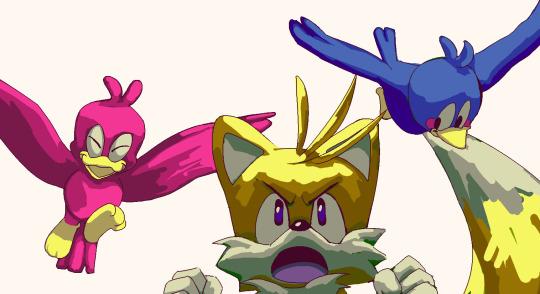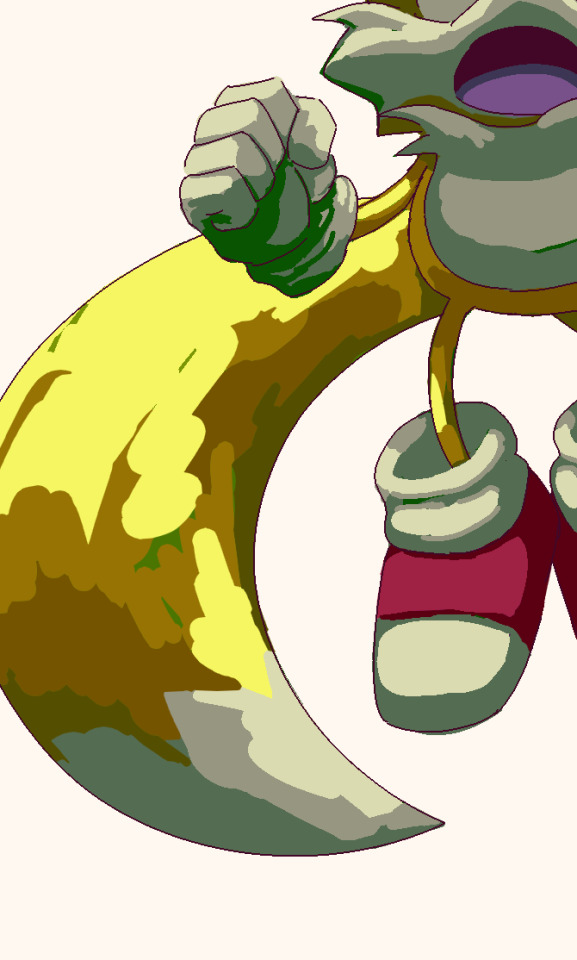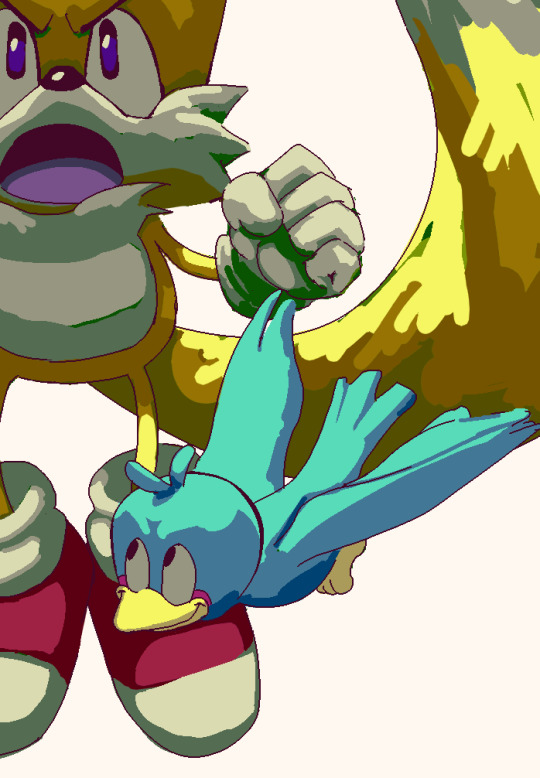#that little f*cker in pink took me ages
Photo




He’s Trying His Best ! !
#Tails the Fox#Miles Tails Prower#StH#goggyart#Whew! Happinesssss!! I'm really happy with how this one came out! I was supposed to upload this together with the last Ttails drawing#but this one ended up taking longer#I'm glad I spent the extra time on the birdies and his tails in particular#that little f*cker in pink took me ages#I love them all very much though!#his tails became that way via mistake at first but then I like them as something to crunch on visually so they stayed#the intention was for Tails to look like he was going 'Super' his body's supposed to appear shiny#I don't know if I was successful all the way#but the effect is quite pretty and dappled to me nonetheless#now with close ups included! >:>
136 notes
·
View notes
Text
the Heartbreak Hoard No. 1 - fuck you homer

Blurb: Greece in the age of heroes. Patroclus, an awkward young prince, has been exiled to the court of King Peleus and his perfect son Achilles. Despite their differences, the boys develop a tender friendship, a bond that blossoms into something deeper as they grow into young men.
But when Helen of Sparta is kidnapped, Achilles is dispatched to distant Troy to fulfil his destiny. Torn between love and fear for his friend, Patroclus follows, little knowing that the years that follow will test everything they hold dear.
Plot: Written from Patroclus’ PoV, the book retells the classic tale of the Iliad with a focus on Achilles.
Good Things to Say About This Book: It’s beautifully written, for one. With almost no dialogue, it reads like an orally told story -- which the Iliad originally was. Those little parts of dialogue are always just snippets, and they stick with you and make you cry later (example: “Name one hero who was happy. [...] You can’t.” “I can’t.” “I know. They never let you be famous and happy. [...] I’ll tell you a secret.” [...] “Tell me.” “I’m going to be the first.” He took my palm and held it to his. “Swear it.” “Why me?” “Because you’re the reason.”). Also, even though Patroclus seems to be a relatively neutral narrator at first, you slowly realise that he isn’t. The further the story progresses the easier it is to read something bitter-sweet into his narrative, like grief mixed with nostalgia, and, of course, his undying love for Achilles. Also, the author knows what she’s doing: Madeline Miller teaches Latin and Ancient Greek (she’s got a BA and a MA in both), and it shows. There are numerous passages where Patroclus clarifies which word a character used -- because there are many ways to say ‘I love you’ in ancient greek. The characterisations are on point (™) and the author makes them stand out: I guarantee you will be able to remember all of their names even after a while, even though they aren’t shown to be truly remarkable. Yes, they are kings and warriors and half--gods, but that’s not why they stick with you. They stick with you because Patroclus shows them as human, and you begin to feel that you know them.
How This Book Broke My Heart: The better question is maybe: How did this book not break my heart? (oh, also: *clears throat* MAJOR SPOILER ALERT FROM THIS POINT ON, EVEN IF YOU HAVE READ THE ILIAD AND THEREFORE KNOW WHAT HAPPENS) The first thing was maybe Patroclus’ backstory. He is a disappointment to his dad. It is heavily implied that his mother is severely mentally disabled due to an injury inflicted to her by her father, and often does not recognise her own son. When he kills a boy in self defence, his father exiles him. He is forced to propose to Helen (yes, the late Helen of Troy) at age nine (9) and endure ridicule from not only his father but also all the gathered heroes. He suffers from nightmares, and the other boys exclude him from their activities, claiming he is cursed. Like, he’s a child. He has to go through so much, he’s alone and convinced that he’s worthless right until Achilles ‘adopts’ him. And this is another thing: Achilles. Throughout the first two thirds of the book he’s this radiant boy, full of love and hope and pride and mischief, he’s open and accepting and honest and naive and he truly believes that he will be happy. But then there’s war, and he doesn’t have a choice anymore. He has no idea what’s coming, you know? He’s only ever heard of war in the stories his father tells, he has never seen anyone die, he has never even fought against anyone outside of his lessons. But he is pushed into this war, and he changes. He becomes angry and hardened and bloodthirsty and pride begins to consume him. He’s a child when he kills a man in battle the first time, barely seventeen. The only person who can still bring out that bright boy he used to be is Patroclus, but his mother puts a strain on their relationship. Thetis is traumatised and terrified of losing her son. She tries to scare Patroclus away many times, and to persuade Achilles to leave him, looming over their love like a dark cloud. Speaking of their relationship, they love each other so much, so much it almost hurts. They are completely devoted to each other, they are each others happiness, and they make it blatantly clear that they would die for each other. Eventually they do, and it’s so heartbreaking, because if Achilles would have been a little less proud, or if Patroclus would have been a little more convincing, then he never would have had to get on that chariot, he would never have had to wear that armour, he never would have tried to climb the walls of Troy, and he would never have died. Theres this scene when they bring Patroclus’ body to Achilles and he realises what he has done and he reaches for his sword to kill himself and he realises that he can’t, because he gave his sword to Patroclus, and he just breaks down. That’s the point where I started getting a bit blurry eyed. But wait! It gets better! (no it doesn’t). Achilles finally cremates his lover’s body (after like, five days of just crying over his corpse) and tells everyone who needs to know that he wants his ashes buried with his when he dies, and then he does die, and his f*cking a**hole of a son turns up and is like “I’m not writing the name of dis servant boy on me dad’s grave” so Patroclus’ soul, which has been in limbo because he can’t go to Hades until he’s properly buried, is forced to stay on earth while Achilles’ goes on, and he waits for months but no one comes by, and he watches everyone leave and he just stays there, on Achilles grave, waiting for someone, anyone, to come by and write his name on the f*cking piece of stone. Can you believe it? They’ve gone through so much, they love each other more than anything else in the world, Achilles calls Patroclus his ‘most beloved’ , and because this one f*cker shows up they’re kept apart even in death. It’s not fair. They hurt so much. They deserve to be happy. But that’s not even the worst part (also because they are eventually reunited) (doesn’t make it hurt less tho). The worst part is that when all that shit goes down, you remember all those little dialogue parts from the happy bits, because Miller brings them up again, only in a different (and infinitely more painful) context. When you’ve read the book through, all those soft happy moments in the beginning will make you cry, because they’ll all have a bitter, bitter taste of foreboding. This book will destroy you.
How Can I Make My Reading Experience Even More Heartbreaking? Contemplate this: many historians think that the events described in Homer’s Iliad (the book The Song of Achilles is based off) actually happened in a similar manner and all the heroes are based off real people. Also try listening to sad songs while reading the last few chapters (I recommend ‘Lay Me Down’ by Sam Smith, ‘Unsteady’ by X Ambassadors, and ‘Wish You Were Here’ by Pink Floyd or songs with similarly depressing lyrics) in order to never feel an emotion other than devastating grief ever again in your life. Then think about what would have happened if Thetis never showed up at her son’s grave. Lastly, go reread chapter ten right after you’ve finished the whole book.
Should I read this book anyway? Yes, yes you should. You will cry for hours but you will be happy about it because honestly, the love story is worth it.
ISBN: 978-1-4088-9138-4
T/W: period--typical misogyny, rape, violence against women, religious and supernatural themes, human and animal sacrifices, major character death, plague, war, slavery, underage sex, abduction of a minor, child murder, child neglect, murder, oath-breaking, child soldiers
#the song of achilles#madeline miller#the heartbreak hoard#v does bookrecs#i cried#also fun fact i almost didn't buy this book because a) the normal cover is ugly af#and b) for some reason i thought this would be some overly kitschy historical fantasy#and i really don't like kitsch
54 notes
·
View notes